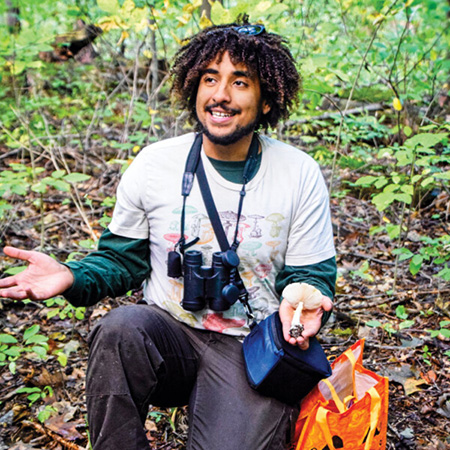Educator to the Core
Winter 2021 Issue
 Educator to the Core
Educator to the Core
By Stephanie Specchio
A 15-second video clip of high school students squealing in delight when they saw baby turtles for the first time was all the motivation Marcus Rosten needed to realign his career. Granted, the turtles were special: these students had maintained the incubator in which the eggs were nestled while they hatched. But the students’ utter delight radiating from the video clip cinched Rosten’s decision to apply for a teaching position with the Buffalo Public School system.
“I’ve always considered myself an environmental educator
Marcus Rosten
“I’ve always considered myself an environmental educator,” said Rosten, who left his
position with the Western New York Partnership for Regional Invasive Species Management
to teach aquatic ecology, effective September 2020. “It is a change, though. My career
had been tracking more toward management in the environmental space. This is an extremely
unusual teaching position. I do not know of any other high schools that have a program
like this.”
In true SUNY ESF fashion, Rosten’s hands-on approach to teaching intimately connects the students with the learning objectives. His students normally have access to two labs with a variety of tanks and incubators as well as outdoor natural resources, including ponds, streams, and wooded areas. Through this class students maintain an aquaculture lab which raises populations of tilapia, red-eared slider turtles, and koi in outdoor ponds.
“Normally, we have snakes and other reptiles as well,” said Rosten, who is a graduate
of SUNY ESF’s Class of 2015. “This year, of course, is a bit different. I’m in the
process of moving everything online, things are even more challenging without having
the crew of students here to help maintain our facilities.”
Rosten, of course, is referring to changes made in light of the global pandemic. In
addition to tending to the animals himself, he is in the process of reinventing the
curriculum to accommodate virtual learning.
“I try to make the learning as relevant to my students’ lives as possible,” said Rosten. “For example, after we talked about urban food webs, I switched the class to my phone and took the students on a virtual field trip. We saw red-tail hawks, squirrels, insects, and plants. All of this helped me illustrate the point in a way that I hope will be more meaningful than listening to me talk on a computer screen.”
Rosten’s ultimate goal with all he does is to connect students to the environment.
“The environment is everything,” said Rosten. “It’s the one thing that relates to all of us. We depend on it for our survival: the air we breathe; the food we eat; the water we drink. We are facing a lot of environmental issues right now. We need everyone — from business leaders and our artists to clothing designers and those working in tech industries to keep sustainable practices top of mind. As an environmental educator, my role is to nurture a community of consciousness for the importance of protecting our planet among future leaders.”
This perspective was likely at the root of a recent award Rosten earned. The North American Association for Environmental Education (NAAEE) recently named him an NAAEE 2020 EE 30 Under 30 Award winner. The annual awards recognize 30 individuals who are applying environmental education (EE) to build sustainable and equitable communities worldwide.
Stephanie Specchio is the associate vice president of communications and marketing at ESF.
